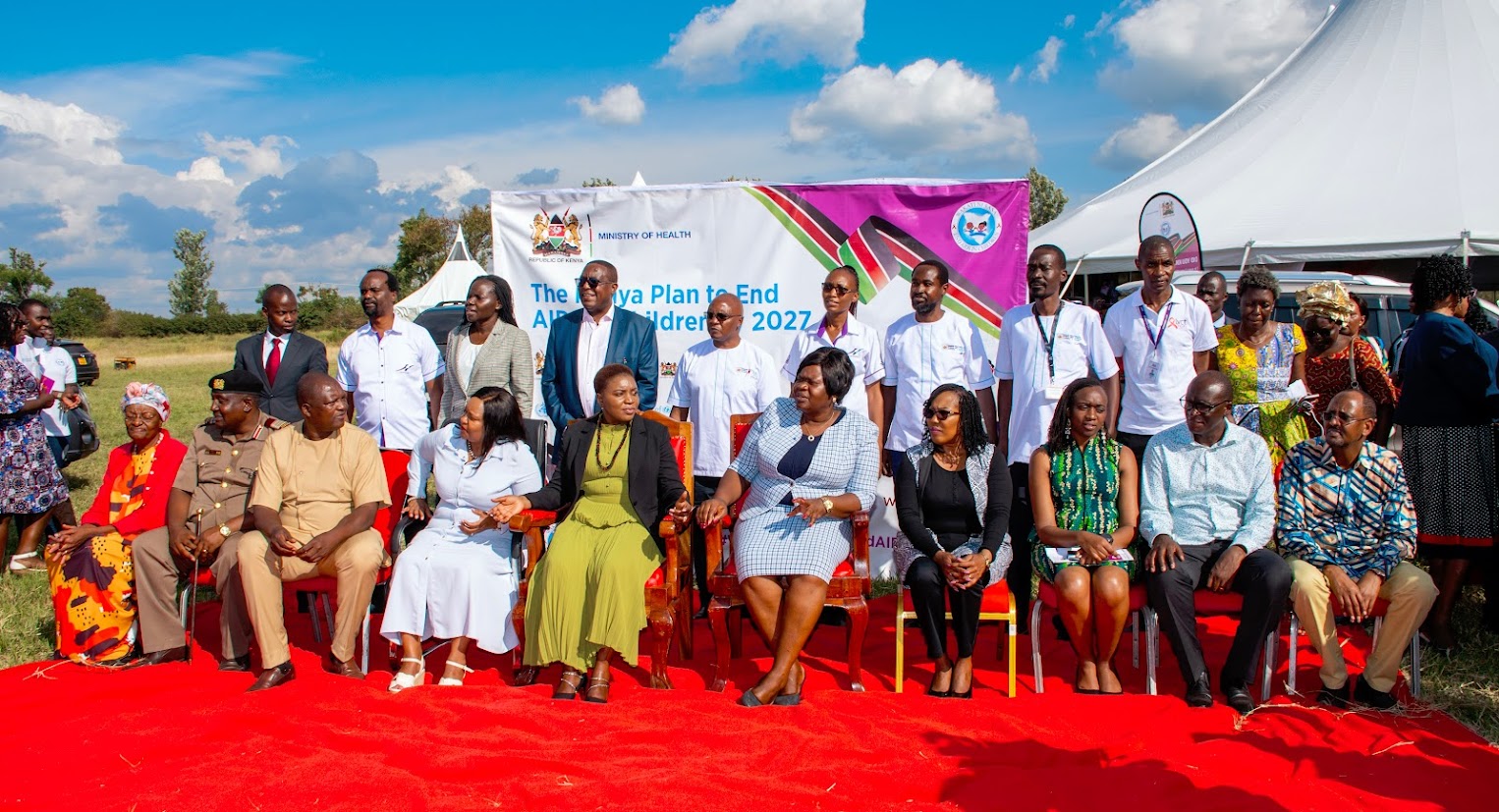Kenya is among the twelve inaugural countries to shape the Global Alliance to end AIDS in children by 2030. The Cabinet Secretary – Health, Dr. Susan Nakhumicha made a commitment in the Dar Es Salaam Declaration for Action to end AIDS in Children on 1st February 2023, to fast track ending AIDS in children in Kenya.
To guide the country towards this commitment, The Ministry of Health through the National AIDS and STI Control Program (NASCOP) and its stakeholders including NSDCC, the 47 counties, PLHIV, UNICEF, UNAIDS, Global Fund, PEPFAR, WHO among others have developed an action plan dubbed Kenya Plan to End AIDS in Children by 2027. This plan is an embodiment of interventions that are being implemented to close the tap of new HIV infections among children. The goal is to end AIDS in children by 2027 and eliminate mother to child transmission of HIV, Syphilis and Hepatitis.
On 8th September 2023, the Ministry of Health launched this plan in Homabay County, with the Cabinet Secretary as the Chief Guest. The launch kickstarted countrywide conversations and interventions to equalize HIV response in children. The successful event hosted by Homabay County lead the Governor, Hon. Gladys Wanga, brought together representatives from the government, elected leaders, partners, communities, media, the public and representatives of the communities living with HIV.
Speaking during the launch, CS Nakhumicha alluded the efforts and progress the country has made to end AIDS especially among adults “The UNAIDS standards for HIV epidemic control (UNAIDS 95-95-95 targets) requires that 95% of all people living with HIV (PLHIV) are diagnosed, 95% of all PLHIV are on treatment and 95% of all PLHIV are virally suppressed. The current UNAIDS 95-95-95 progress among adults is 95-95-90. However, among children the performance is 85-85-74.”
As members of the Alliance, Kenya will implement a 4-point actions within the next three (3) years to bridge the gaps, and fast-track the progress of ending paediatric AIDS.
The Kenya plan implementation approach focusses on addressing vulnerabilities, inequalities that sustain the new infections and impede progress by sub-populations and geography; closing all the bottlenecks in diagnostics systems, commodity security and health workforce; renewing partnerships and align resources with country priorities and costed work plans; and finally, prioritizing data and information system to have an informed science led response at all levels.
Through elimination of Mother-To-Child Transmission of HIV, this ambitious goal is tailored to address gaps in HIV and AIDS service delivery and provide avenues for best practices in the quality of care for all pregnant women and breastfeeding mothers in urban and rural Kenya.
The launch was also a flag off of the 100-day 2023 Rapid Result Initiative (RRI), dubbed “Wakati ni sasa End AIDS in children.” The RRI is focusing on saturating client- centred interventions at the facility and community levels to reduce missed opportunities in the quality of care for pregnant, and/or breastfeeding women and children. This exercise is being implemented in all 47 counties while ensuring stakeholder engagement.
CS Nakhumicha called for and acknowledged collaborations in the HIV care cascade to bridge the glaring gap in HIV epidemic control progress for children.
“Through collaborations and partnerships, over the last ten years, Kenya reduced new HIV infections by 57%, and AIDS-related death decreased by 68%. However, mother-to-child transmission rate remains high at 8.6%, treatment coverage children living with HIV is 85% with about 74% of those virally suppressed. This is concerning as children have been left behind and their voices remain unheard.”
With successful HIV treatment and care, it will ensure viral suppression and facilitate quality of life for the persons living with HIV, while reducing the risk of HIV transmission. A strengthened service delivery to increase testing for pregnant/breastfeeding mothers, early testing of babies, linkage to care and treatment for mothers and children and adolescents living with HIV.
Other launched guidelines included The Private Sector Engagement Framework and the HIV Three-Test Algorithm.
Present during the launch was also the Cabinet Secretary, Rebecca Miano, UNICEF Regional Advisor, East and Southern Africa, Dr. Laurie Gulaid and the Country Directors; UNAIDS Kenya, Dr. Medhin Tsehaiu, WHO Kenya, Dr. Abdourahmane Diallo, UNICEF Kenya, Dr. Shaheen Nilofer, CDC Kenya, LVCT Health Kenya, Dr. Lilian Otiso, EGPAF Africa, Dr. Eliud Mwangi, and Paediatric researchers among others. The guests called for commitments to end AIDS in children by 2027 as childrens’ health is a human right issue and a cost-effective investment in health, for the country and beyond. Now is the time to act! Wakati ni sasa!

